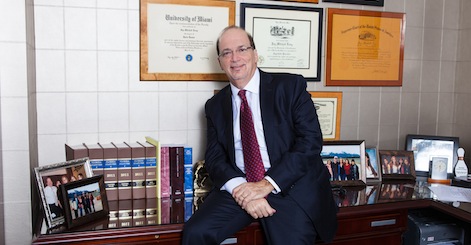Lawyer Limelight: Jay Levy
By Melissa Chan | July 14, 2014 | Lawyer Limelights

Photo provided by the firm.
Jay Levy has more than 35 years of experience trying cases and handling appeals. He recently represented a businessman who filed suit against pop singer Paulina Rubio for missing a concert in Tunja, Columbia. After a lengthy legal battle, the suit was resolved with a confidential settlement before Miami-Dade County Judge Abby Cynamon.
In April 2014, he won a decision on behalf of his client in the appeal of a case surrounding a custody dispute in which the mother was of the Miccosukee Tribe and the father was not. The judge ruled in favor of the father and concluded that the case should proceed in Florida court and not in tribal court. Levy, a 1976 graduate of the University of Miami School of Law, started his own firm Jay M. Levy P.A. Attorneys at Law in 1991.
Lawdragon: Can you tell us how you were hired for the case against Rubio and how you resolved them?
Jay Levy: I was retained by the plaintiffs in the Rubio case after their prior attorneys were disqualified by the Court. I had been involved in the disqualification matter, so I was asked by the client to represent them in the trial. On the eve of trial, the parties agreed to amicably resolve the case.
LD: What were some of the challenges you faced in the custody case involving the mother who was a member of the Miccosukee Tribe of Indians?
JL: One of the major challenges I faced in this case was the lack of legal precedent in Florida with regard to the resolution of competing proceedings between a tribal court and a state family court. Due to the lack of legal precedent, I was essentially operating in “uncharted legal territory” in Florida. I overcame this deficiency by locating general principles of law decided by courts of other states and arguing for their application to this case. I located and looked to decisions from courts in the Western United States, where there have been somewhat similar cases, to help make the argument that the state court was the appropriate court for the custody dispute.
Ultimately, I was able to point out the inherent unfairness of how the Tribal Court treated a non-Miccosukee which prevented my client from receiving a fair trial.
LD: Did you always envision yourself starting your own private practice?
JL: No, while I was in law school, I anticipated that I would get a job with a law firm, and then, I’d be one of many partners. Fortunately for me, that never happened and my career path took a different turn, ultimately allowing me to start and maintain my own practice without the limitations of working for others in a larger firm.
LD: How has your practice changed since the early part of your career?
JL: In the early part of my career, I was strictly writing briefs, and doing appellate work. I only occasionally went to court. But then I started accepting trial level work and I was going to circuit and federal district courts on a regular basis.
I now handle much more trial work and find myself in court almost every day. On any given day, I’m taking depositions, working on discovery, going to court, trying cases, etc. My life is far more hectic, but I enjoy it.
LD: What do you wish you had known or done differently in school? And what advice would you give to current law school students?
JL: I can’t say that I would have done anything differently. However, if I’d known what type of law that I'd end up practicing, I would have concentrated more on litigation and trial courses in school. I took some courses that I’ve never used – tax law and the like – because at one point I’d envisioned that I would be an office lawyer practicing estate and trust law.
The advice I would give to current law school students is that they shouldn’t start their own practice right out of law school. The practice of law is very different than learning what the law is. There are many nuances to the practice of law that aren’t learned in law school. Students right out of law school need a lot of practical experience, so I recommend they go to work for a firm and make sure they receive sufficient mentoring so they learn how to properly practice law.
LD: What do you do for fun when you’re outside the office?
JL: When I’m outside the office, I enjoy traveling – I was recently in London to celebrate my youngest daughter’s graduation from college (Summa Cum Laude) and her starting medical school this fall. I also like to watch old movies, spend time with my wife and daughters, and play with my dog.

